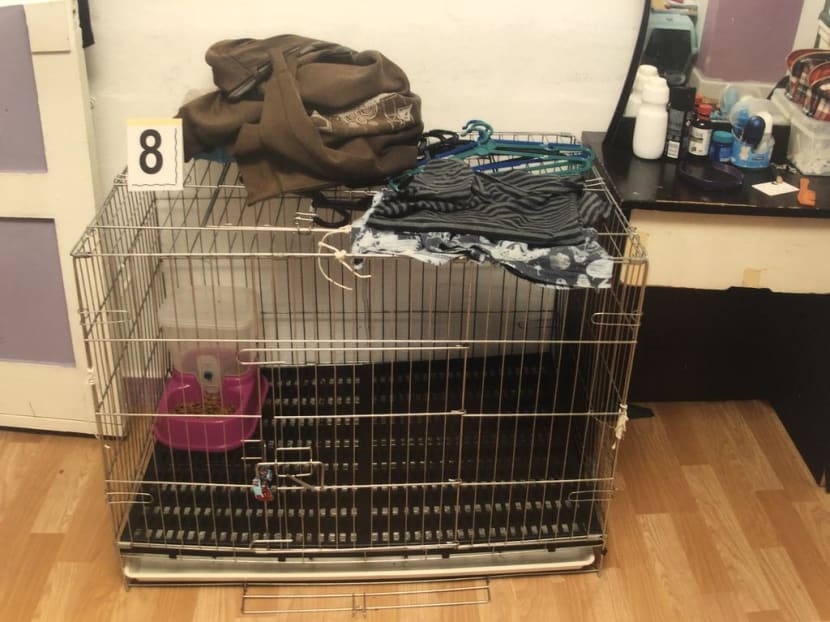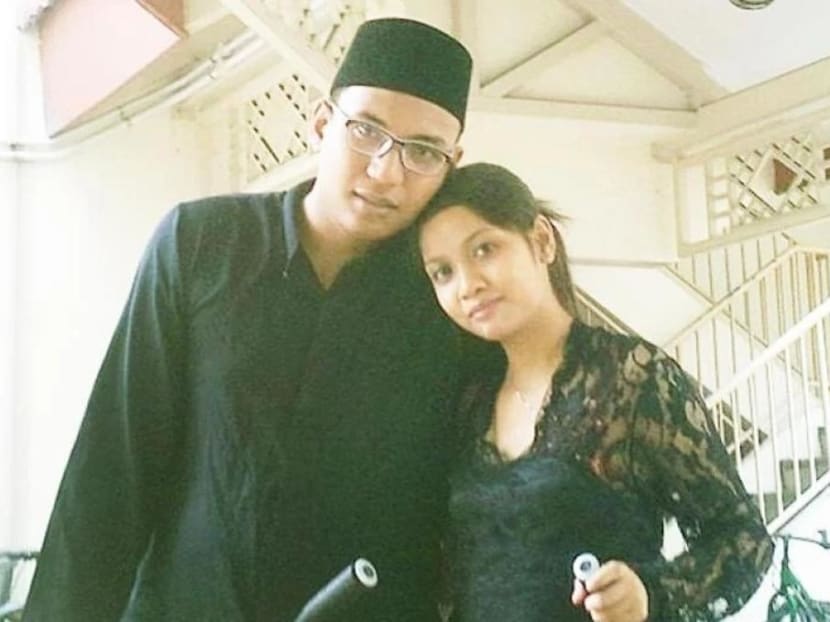Prosecution appeals for life imprisonment for parents who abused 5-year-old son to death
SINGAPORE — Scalding their five-year-old son with hot water four times in a week until his nerves were exposed and three-quarters of his body was covered in burns. Abusing him in other ways such as locking him in a cage meant for their pet cat.
- Azlin Arujunah and Ridzuan Mega Abdul Rahman abused their young son till he died in 2016
- They were acquitted of murder by common intention for legal reasons
- The prosecution appealed against the High Court’s decision not to impose life imprisonment for the couple, and for Azlin to be convicted of murder
- The Court of Appeal reserved its decision on the appeal
SINGAPORE — Scalding their five-year-old son with hot water four times in a week until his nerves were exposed and three-quarters of his body was covered in burns. Abusing him in other ways such as locking him in a cage meant for their pet cat.
If Azlin Arujunah’s and Ridzuan Mega Abdul Rahman’s actions did not warrant life imprisonment, what else would?
Prosecutors put forward this argument on Tuesday (Sept 7) as part of their case in the Court of Appeal, more than a year after the married couple, now aged 29, were each sentenced to 27 years' jail for abusing the child to death.
Azlin was given one more year behind bars in lieu of caning, taking her total jail sentence to 28 years, while Rizuan was further sentenced to 24 strokes of the cane.
The couple had claimed trial in the High Court to a charge of murder by common intention. The capital charge was premised on four acts of burning or scalding committed in the couple’s one-room rental flat from Oct 15 to 22 in 2016.
They were acquitted after Justice Valerie Thean found that the element of common intention was not sufficiently proven, as not all of the incidents involved both parents.
Specifically, there was not enough evidence that Ridzuan shared a common intention for the first and third incidents, where Azlin had acted alone.
Legally, the common intention to inflict a serious enough injury to cause death also needs to be formed before the first offence is committed, the judge noted.
The judge then convicted both of reduced charges of voluntarily causing grievous hurt by a dangerous weapon or means. They also pleaded guilty to several other charges of ill-treating the boy under the Children and Young Persons Act.
While prosecutors sought the maximum sentence of life imprisonment for the reduced charges, Justice Thean said that this was not appropriate because medical evidence could not determine which injuries arose from which incidents.

ABUSED IN ‘CRUEL AND INHUMANE’ MANNER
The prosecution appealed against the sentences imposed on Azlin and Ridzuan and sought life imprisonment in both cases, as well as for Azlin to be convicted of murder by common intention.
The maximum penalty for the reduced charge is life imprisonment.
Murder under Section 300(c) of the Penal Code carries either the death penalty or life imprisonment. The prosecutors indicated that if their appeal on the murder acquittal fails, they would still seek life imprisonment for Azlin on the lesser charge.
At the appeal hearing in the apex court on Tuesday, they reiterated that it has always been their case that Azlin was “factually and legally responsible” for all four scalding incidents. She had splashed the boy with hot water the first three times and egged her husband on during the fourth incident.
Lawyers for the couple argued that the sentences imposed were appropriate, given factors such as Ridzuan’s youth and remorse, and statements by Azlin that she did not realise her actions would have such severe consequences.
Much of Tuesday’s hearing, lasting more than three hours, was devoted to legal arguments on how the “common intention” provision under Section 34 of the Penal Code should be interpreted.
Senior Counsel Goh Yihan, dean of the Singapore Management University’s law school, made arguments as an amicus curiae — or a friend of the court. They are appointed by the court in certain cases to assist on legal issues.
Chief Justice Sundaresh Menon, who heard the appeal with four other judges, expressed concern over how medical experts were questioned during the High Court trial. He noted that the incidents were “analysed in isolation” as if the others had not happened.
Deputy Chief Prosecutor (DCP) Mohamed Faizal Mohamed Abdul Kadir, who was not involved in the trial, responded that it would be difficult to hypothesise why the evidence turned out this way.
Nevertheless, he pointed to the victim’s injuries to argue once more for life imprisonment. He said that Azlin and Ridzuan abused their son in a “cruel and inhumane manner”, including pinching him with a pair of pliers, burning his palm with a heated spoon, and locking him in the cat cage.
They then splashed hot water on him four times, leading to his death in KK Women’s and Children’s Hospital on Oct 23, 2016.
He had cuts on his head and face, nasal bone fractures and extensive bruises over his limbs and back. His skin had also turned yellowish, whitish, wet and raw, with parts peeling off.
DCP Faizal said: “In particular, the evidence at the lower court suggests that after the first scalding incident, his nerves would be exposed. It would have exponentially increased the suffering on the part of the victim from then on.
“Any look at the photographs (of the boy’s burns) will tell its own unfortunate tale… It was a group attack on a young child. He could not even go to the other parent for comfort.”
The boy’s injuries included substantial bleeding under his scalp measuring 18cm by 10cm, which was “almost the entire head”, a forensic pathologist testified during the trial.
The couple chose not to take the witness stand in their defence. They had admitted to abusing the boy in several police statements that they gave after their arrest.
'HARD TO UNDERSTAND LOGIC'
The prosecutor also noted the High Court’s finding that Azlin suffered from adjustment disorder with depressed mood.
This and Ridzuan’s purported low adaptive functioning were among the reasons Justice Thean did not sentence them to life imprisonment, after she concluded that they did not entirely understand the likelihood of death resulting from their actions.
DCP Faizal argued that it was “hard to understand that logic”, and that Ridzuan’s adaptive functioning was in line with his peers.
“If the facts in which two biological parents continued throwing scalding water until their child died, until his nerves were exposed and there were burns on 75 per cent of his body — if that doesn’t warrant life imprisonment, I struggle to understand what warrants it,” the prosecutor said.
Two of the couple’s lawyers, Ms Cheryl Ng and Mr Eugene Thuraisingam, argued that the sentences imposed were not manifestly inadequate.
Ms Ng, who represented Azlin, told the court that life imprisonment was warranted if Azlin fully intended death to be the consequence of the scald injuries, but the evidence did not support this.
Ms Ng quoted some of Azlin’s police statements, where she had said among other things: “I did not think it would end up like this. I was thinking it might scald him but I did not think he would end up like this.”
Mr Thuraisingam told the court to bear in mind three facts: Ridzuan was a young man aged 24 at the time of the offences, he admitted responsibility from the start, and was remorseful.
Chief Justice Menon said that the apex court would reserve its decision, but did not indicate when it will issue it. The couple, who appeared in court dressed in purple prison jumpsuits, remain in custody.












